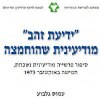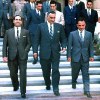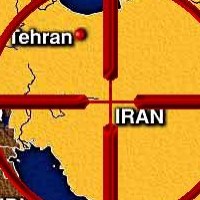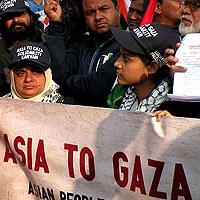![]()
Mon, Oct 11, 2010 | The Meir Amit Intelligence and Terrorism Information Center
Interview With Turkish Journalist Who Was On The Mavi Marmara Contradicts UN Report
In a TV interview, Turkish journalist Şefik Dinç, who was on the Mavi Marmara and wrote a book about it, said that no shots were fired from the Israeli helicopters and that IDF soldiers did not open fire until their lives were in danger. The interview clearly contradicts the IHH narrative and the biased and false UNHRC report about the Mavi Marmara.
On September 24, the Turkish journalist Şefik Dinç granted an interview to Israel’s Channel 1. Dinç witnessed the Mavi Marmara confrontation and described the incident in a book he wrote, titled Kanlı Mavi Marmara (“The Bleeding Mavi Marmara”). His account is fairly balanced, giving considerable weight to events that he personally witnessed and experienced.[1]
For example, the UNHRC’s Mavi Marmara report claimed that the IDF used live ammunition from the helicopters before the soldiers landed and that the IDF extremely abused the male passengers, as well as sexually insulted the female passengers. Şefik Dinç, however, testifies that the IDF soldiers did not fire from the helicopters or while descending to the ship’s deck. The IDF soldiers started to use their weapons after they were attacked by violent activists using metal rods and after they discovered that IDF soldiers were taken below deck. He also testifies that he was treated well by the IDF after the incident.
In the interview granted to Channel 1, Dinç reiterated a key point he brought up in his book. He said that he had seen with his own eyes that IDF soldiers who descended from the helicopters on the Mavi Marmara did not fire at the passengers. According to Dinç, it wasn’t until the soldiers realized that some of their friends’ lives were in danger that they began using live ammunition.[2]
Dinç’s descriptions as well as additional remarks given in the book he wrote and in the interview are consistent with the testimonies of the Israeli soldiers who boarded the Mavi Marmara. They completely contradict the narrative constructed by the IHH about the flotilla events, which relies on the biased testimonies of activists who were on board the Mavi Marmara. Those testimonies were the basis for the prejudiced, one-sided report compiled by the UN Human Rights Council and, we assume, will be key in Turkey’s report to the UN fact-finding mission.
Following is a transcript of the interview granted by Şefik Dinç to Channel 1 on September 24. Dinç was interviewed by Rafael Sadi, the spokesman for the Organization of Turkish Immigrants in Israel. The interview was transcribed by the ITIC:
Interviewer: In your interesting book, you write that the Turkish government should not have let the flotilla set sail, why?
Dinç: Israel declared several times that it would not let the ships enter the Gaza Strip. In light of those statements, we did not believe that those ships could reach Gaza. The ships should not have set sail from Turkey, but things happened as they did, and they set sail after all.
Interviewer: According to your eyewitness account, IDF soldiers only opened fire when they felt that their own lives or the lives of their fellow soldiers were in danger.
Dinç: As you know, I was on board the ship. I saw with my own eyes that when the soldiers came on helicopters and started landing on the ship, they did not fire. It wasn’t until the soldiers were met with resistance and realized that some of their friends’ lives were in danger that they began using live ammunition.
Interviewer: Did you notice anyone using knives or iron bars?
Dinç: Actually, I saw no knives being used. I did see iron bars being used.
Interviewer: In your book, you describe cases of humane treatment from IDF soldiers [of the detained ship passengers], such as removing their handcuffs, and even an interesting encounter in Israel with a Jew of Turkish descent who gave you his mobile phone.
Dinç: The soldiers uncuffed some people who were having difficulties, particularly older people, women, and people who did not act aggressively. As for the Israeli policeman, his Turkish was excellent, we spoke, and he said that he had immigrated to Israel from Istanbul. He asked me if I contacted my family and whether I had a telephone to make a call. I told him I didn’t, and then he gave me his own mobile phone so that I could call my family. I thank him again.
Interviewer: Your book is more balanced and less one-sided. Aren’t you concerned that the Turkish government won’t like it, and that you will come under criticism?
Dinç: When I started writing the book, I knew that many elements in Turkey wouldn’t like what I had to say, such as members of the IHH, the Turkish government, and the Israeli government as well.
Interviewer: Thank you very much. I wish you continued success as an impartial journalist.
Click here to see a video of the Interview
Notes:
[1] See the September 23, 2010 article: “Turkish Journalist: Mavi Marmara Crisis Was A Calculated Gamble”.
[2] In his book, Dinç says that the first shots were heard only after three IDF soldiers were taken hostage and brought to the lower deck.



 RSS
RSS











Interview With Turkish Journalist Who Was On The Mavi Marmara Contradicts UN Report | #Israel #Turkey #IHH #UN #biased http://j.mp/d8O7eQ
Interview With Turkish Journalist Who Was On The Mavi Marmara Contradicts UN Report http://pulsene.ws/8fW8
RT @CrethiPlethi: Interview With Turkish Journalist Who Was On The Mavi Marmara Contradicts UN Report | #Israel #Turkey #IHH #UN #biased http://j.mp/d8O7eQ
Interview With Turkish Journalist Who Was On The Mavi Marmara Contradicts UN Report http://bit.ly/c02jJH v